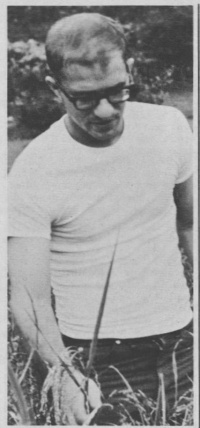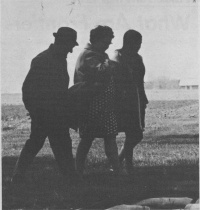If this site was useful to you, we'd be happy for a small donation. Be sure to enter "MLA donation" in the Comments box.
Studebaker, Ted (1946-1971)
Mennonite Weekly Review obituary: 1971 Apr 29 p. 1
Birth date: 1946
text of obituary:
Akron, Pa. — (MCC) — Word was received here April 26 that Ted Studebaker, 25, a volunteer staff member of Vietnam Christian Service, was shot and killed Sunday at Di Linh, South Vietnam when several soldiers, presumably North Vietnamese or Viet Cong, entered the local staff headquarters.
Studebaker was married to a fellow VNCS worker, Ven Pak Lee, only a few days before his death. His widow is a native of Hong Kong and had formerly been with Asia Church Service.
Mrs. Studebaker and two other resident workers, Phyllis Cribby, VNCS nurse, and Daisy Barnes, International voluntary Service worker, were unharmed.
A member of the Church of the Brethren, Studebaker was from Union, Ohio. The report of the tragedy was received by his parents, Mr. and Mrs. Stanley Studebaker.
The young volunteer was the first VNCES worker killed in hostile action in the Vietnam war.
Mennonite Weekly Review obituary: 1971 May 6 p. 13
text of obituary:
Services Held in Ohio For VNCS Volunteer
Akron, Pa. (MCC). — Funeral services were to be held the evening of May 3 at the West Milton (Ohio) Church of the Brethren for Ted Studebaker, 25, Vietnam Christian Service volunteer who was killed at Di Linh, Vietnam.
Studebaker was shot by soldiers, presumably North Vietnamese or Viet Cong, who entered the local staff headquarters. he had been married only a few days earlier.
Paul Longacre, MCC director for Asia, and Gayle Preheim, former MCCer who had worked with Studebaker in Vietnam, were to represent MCC at the funeral.
Mennonite Weekly Review obituary: 1971 Jun 24 p. 11
text of obituary:
Tribute to VCS Worker Killed in Vietnam

"' ' 'COOL IT' ' ' and don't fret; this boy knows what he's doing."
Those were among the parting salvos as he left his Ohio homeland in the spring of 1969 for Brethren Volunteer Service and Vietnam. In effect, the sentiment was voiced again by Ted this spring from Vietnam, In a letter he wrote late on April 25 to critics back home. It was the last letter Ted was ever to write.
That night shortly after midnight, the residence of the Vietnam Christian Service unit at Di Linh, South Vietnam, was shelled with B-40 rockets, blasted with a plastic charge, and raided by Vietcong soldiers. Three women who had made it to the bunker of the stairs of the old hunting lodge were not harmed; Ted, still in his bedroom, later was found shot to death. For him two years of creative interchange in the lives of the central highland peoples in and around Di Linh, and a commitment to a third year of service, had come to a tragic end.
AMONG the three women who survived the terror was Ted's wife of one week, Ven Pak, a volunteer from Asian Christian Service whom Ted had learned to know in language training in Saigon. Their wedding, which had occurred a block down the road at the Koho Tin Lanh Church eight days before, was a festive occasion not only for the church but for the wider community.
It was in that community, 140 miles northeast of Saigon, that I had spent a couple of days with Ted some four months before, observing what he was trying to do in a foreign land. One of my clearest impressions was that Ted scarcely seemed a foreigner there, because of his own simple tastes, because of his proficiency in both the Vietnamese and Koho languages, and perhaps above all, because he felt genuinely enriched by the culture of those around him.
THIS AT-HOMENESS became increasingly apparent as I saw how he related to neighbors, local officials, youth, teachers, pastors, priests and peasants in our trek from village to village and door to door. It was discernable through his enthusiasm for his work: the demonstration paddies where he had greatly increased the yield of native rice; the improvised brooder house where he was readying 200 Pilch baby chicks for distribution to villages; the cooperative store he was helping local people to establish; and his trust in and encouragement of the Montagnard members of his VCS team.
In love as he was with the people and the land, Ted was far from accepting what he saw happening to their lives. "The biggest obstacle to development work in Vietnam is simply the war itself," he told me as a thousand yards from us American-piloted helicopter gun ships loaded ARVN troops likely destined for a search mission back in the hills. It is from back in the hills that thousands of Montagnard tribesmen have been driven, forced to trade their once lush farmlands for "temporary" villages and less productive paddies along the main road. Here, among these refugees, Ted's efforts in agriculture development were directed.
WHILE HISTORICALLY the Montagnards have been the outcasts of Vietnam, the anguish Ted felt was that now they had become pawns in the program of pacification and Vietnamization. In striving to learn of the traditions and values of the Montagnards, Ted came to respect them greatly. It was no surprise to learn that the best man at his wedding was a Montagnard — K'ra, a teammate in VCS and close personal friend, and that the service itself was in the Montagnards' Koho language.
In two days of travel together Ted and I went from Saigon to Nha Trang to Bao Louc to Di Linh to Dalat. Seemingly the most insecure area was the section in and around Di Linh. Ted was relaxed, though, as long as one did not need to be on the roads at night or did not get detained while traveling close to American military convoys. He told of shellings now and then into Di Linh and other villages, and of mine explosions, making children and other innocent persons the victims of war.

ON OCCASION as we traveled Ted talked of his upcoming plans for marriage. He and Ven Pak had announced their engagement in Vietnam, but had yet to break the news to Ven Pak's parents, which meant a journey to her home in Hong Kong, and to Ted's family in the States.
When I last saw Ted in Dalat, he told me that he hoped that in this highlands town, which is a beautiful blend of Vietnamese and French influences, he and Ven Pak would honeymoon in the spring. His hope was fulfilled; that is how he spent part of the final week of his life.
Upon meeting Ven Pak at the Studebaker home near Union, Ohio, early last month, they day before Ted's memorial service, what surprised me most was how many of Ted's qualities seemed to be her own. The gentleness, the humility, the sincerity, the warmth, the determination were readily conveyed. Even more so her life statement shared with the directors and staff of Vietnam Christian Service seemed to echo what Ted himself might have written:
"I'm sure all of you share my grief over his death, but I hope you will grieve even more for those who do not understand what he did."
THE REAL STORY of Ted is not only of his life and death and Vietnam, it is also of his years of growing up in Ohio's "Studebaker Country"; of his feel for the soil and things of the farm; of his devotion to high school and college football and other sports; of swimming in the farm pond; of older brothers, one of whom was in military service in Germany, another in Brethren Voluntary Service in Morocco, and a third in International Voluntary Services in Laos; of three sisters and a younger brother, of studies and friendships at Manchester College where he earned his way through school and did four years' work in three; and of master's study in social work at Florida State University.
Ted's story is closely aligned too with the West Milton Church of the Brethren, where in a sermon in August 1967 he revealed his feelings about the war. Holding up a newspaper clipping of a starving, homeless child, he read an accompanying article which said, "Hunting was good today in the Mekong Delta Region, U.S. Marines bagged 45 of the enemy, wounded scores, and completely wiped out one small village."
"Hunting was good today!" Ted responded, "Just like the sportsman who comes back from a day of rabbit and pheasant shooting .... The dehumanizing process of war concerns me deeply. What can I do about man's inhumanity to man?"
WHILE IN VIETNAM Ted continued to be in contact with his home church. "Second only to my family," he wrote a year ago, "you as representatives of the West Milton Church of the Brethren are responsible for my thought and actions concerning conscientious objection to the military, my pacifistic views, and my volunteer service. . . .
" . . . I do not pretend to understand all the whys and wherefores of this crisis, but one thing stands our clearly in my mind. This war is immoral and wrong, and the burden of blame is on the U.S. military, the U.S. government, and the U.S. people. . . . "
This was the letter, picked up in the Southern Ohio Herald and then this past March in the Troy, Ohio Daily News, that prompted a Troy couple to write Ted of their disappointment in his stand, questioning his understanding of the Bible, wondering even if the organization he was serving was "Christian."
ONLY HOURS before his death, Ted replied, thanking the family for writing, indicating the difficulty of debate by letter, and clarifying only one point. "I do not feel the enemy is 'right' any more than I feel the U.S. military is 'right' here," he wrote, "I believe strongly in trying to follow the example of Jesus Christ as best I know how. Above all, Christ taught me to love all people including enemies, and to return good for evil, and that all men are brothers in Christ. . . . I believe love is a stronger and more enduring power than hatred for my fellowmen, regardless of who they are or what they believe."
EXCERPTS from the letter, the statement of Ven Pak Studebaker, and tapes of guitar playing and singing which Ted had recorded only weeks before in Vietnam were used by Pastor Phillip Bradley in the memorial service May 3. On the altar of the church were two Bibles — Ted's heavily marked edition in English and Ven Pak's in Chinese, a Brethren Service cup, a shovel, Ted's guitar, and a banner lifting up in essence the affirmation with which he had concluded the final letter and many letters before it: "Life is great, yea."
It was on this note that Ted Studebaker, 25, a dissenter to despair, a champion of love, a man of peace, came home..